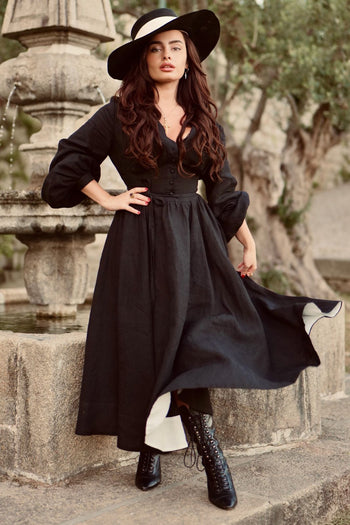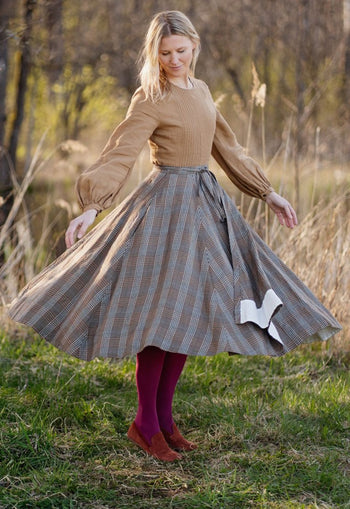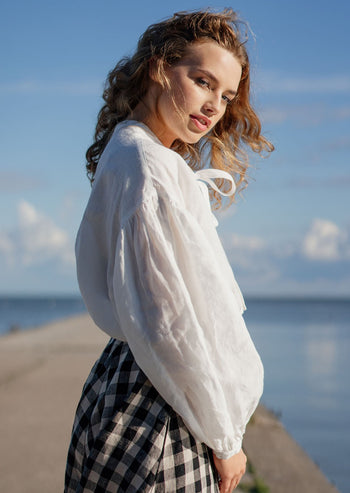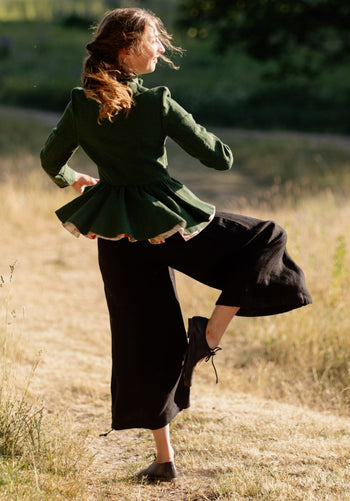Eskedar – a woman of a hundred lives
There are some moments in life that proves magic is real. It felt the same way when one gloomy morning in the middle of winter, somewhere in the old town of Vilnius true wonders were happening: swirled between linen dress folds was sitting a petite Ethiopian woman, from her hands charming Ethiopian coffee aroma was filling the room. And as in that moment, she seemed so tender, fragile and petit wearing Son de Flor linen dress, she was flowing with the powerful energy of femininity, devotion and ambition – everything and even more that fits in a definition of a woman. Son de Flor invites you to be that part of the magic and to meet her – our heroine Eskedar.

Eskedar, many of us have heard at least a little piece of your story and it feels like that you got to survive much more just in a few moments than some generations only have a slight chance to imagine such things. Your journey of the life started about 13 years ago – how do you see yourself today?
As a woman who was smuggled through Sahara and Mediterranean Sea in devastation I always catch myself thinking is this real? I'm I alive? why I have survived that journey while on average 6 people everyday are dying taking the same path. So if I’ve been so lucky and I have been given the chance to continue the journey of life survive, I live life meaningfully, find my purpose for this extra time I have granted through the courage to be myself otherwise, why did I survive if I can’t be myself? why did I survive if I will not serve a higher purpose than just exist for me? I see myself not only as a person who belongs to myself, but also as a person belonging to society, just as I do to a country I live in and the country I come from, as well as I belong to the Earth. I am thinking extensively about what I am doing and I present myself as a public figure that strives to do good for those in need, especially to those who lost hope.
You are a living proof that a person can tirelessly fight for a meaningful life – do you ever face any difficulties in it or perhaps such mission brings only advantages?
As a person bearing such mission I believe that the only risk I might take is the consequence of speaking my mind. people and governance, for example.with regard to other people, government etc... The relationships I establish with depends on the value, intention and mutual respect. On the other hand, we don‘t have what to lose because the time we spend on this planet is too short to worry about the consequence of standing for the right thing.Whenever you feel happy or are suffering eventually it will come to an end so instead of choosing to be indifferent to the problems of others, grow empathy. This is the best thing that comes together with my mission. You start to see that there actually is no separation between small or big problems – your problems and the problems of others, all of them are equally important and most of the time they are interconnected as we all are.


The journey was full of challenges; one unknown was followed by another – what was more demanding: to travel through the desert and seas or to tame a strange and distant place and call it your new home?
Your journey continues until your last breath, thus everything you have experienced no matter if it was good or bad time in your life, will leave a mark on your sou. Sometimes you have to relive the events in your memory in order to encounter, reconcile and forgive, so that you can move forward. Life can always be difficult even if a person has everything or nothing, often there is no difference.
I wouldn‘t say that a particular time was more challenging than the others because when you are in the centre of the event, it seems to be the hardest moment. However, when you overcome it, the next one might seem to be more difficult because you have not found the solution yet. Gratitude is what helps me to go through all difficulties. It can always be easier if you remember your good health, whether you are happy or you are the one who has shelter or clothing to start with. And being responsible helps me not to let my own worries to overwhelm me so much that I could not notice a foreign disaster. And it‘s not a simple task as living in this world is also difficult to be accountable in terms of consumption, political opinion or the system in which we live in. Therefore, every difficult situation is impossible till it’s done. It was hard to survive the journey and I did and a place once unfamiliar is my home and the once impossible is a piece of cake today.

Talking about responsibility, what is your take on supporting your family back in Ethiopia? Because often it is understood that the one who made one‘s way to a better position in life is almost obliged to do so. Do you even keep tight connection with Ethiopia up to this day?
Yes, there is so much of home there in Ethiopia as much as there is home here in Lithuania. And in my case, I have much broader responsibilities. I am very much of an entrepreneur, so I instinctively look for ways to make a difference and impact to provide a better living for the loved ones. My purpose on that regard is not how to help to my direct relatives , but rather to the society and country as a whole. So, when it comes to my contribution it is through business and building a bridge between my past and present. I Import Ethiopian coffee and roast in Lithuania. In such way I support Ethiopian farmers and many other things that come together with it and I am very grateful to be given such opportunity to create a beneficial and sustainable relation between two countries I call home.

Your entrepreneurial soul is something what your generation people have in Ethiopia as they are also hungry for opportunities as yourself or is it something unique that you have developed personally?
It’s always hard to say that it’s only me, or environment that affects me. I myself have Master’s degree in International Business and as human beings we always seek for opportunities as it is in your nature. I grew up in a place where my grandparents used to have a small shop where even at young age, being 10-12 year-old, I have worked as a sales person. I built my knowledge starting a t in small steps as how much things cost and that I could support my grandmother staying at that shop and sell things to people who lived in that village. So this is probably where I learned things, knew how exchange and trade works and the way I grew up gave the base for who I am today.


You are one of those people who can describe what a struggle is as you faced many of them. Meanwhile, you have a Master‘s degree, own a business and keep being vocal about social issues in our world – where does such strong personality come from?
Struggle is a state of mind and we all have our hardship, and one’s hardship always seems to be much harder than of others. I wouldn’t dare to say that surviving a breakup is less difficult than someone needing medication in a developing country or people living in less distressed areas face less struggle than the ones in the war zone – problems are different but equally devastating for the person who deals with it. Struggle comes from the nature of humans as we are the species with growing needs and tendency to innovate and with that comes a struggle to do better, to grow and change.
One of the biggest issues in Ethiopia is girls’ education. For instance, in Lithuania there is no question on who has to get the priority to go to school, a boy or a girl because education is mandatory for all children till the age of 16. However, in Ethiopia there are many girls that are unable to study as they have to support their family and work from a young age or get married early, therefore many opportunities are not that available for them as for boys and this problem combines from many complex things.
I grew up in a village where my classmates in 8th grade got married. But my grandparents and especially grandfather was the person who believed in girls’ education. Actually, he was the one who brought school to our village and was community leader. He believed in me or my cousins, so he was the one who gave me the wings that I needed in life. I have always looked for a person with a quality of him: someone who cares for society, someone who has empathy for others and what is happening in the world. I was a very strong headed girl and stubborn girl thus, according to the standard in the society I have lived in, I belonged to the type of women that no one will ever want to marry.

Since you grew up in such conservative and pre-established society, what‘s your take on feminism?
You can put me in a frame of feminist as I see myself as one. It is important to understand that it is not something about going against men – it’s an absolutely different thing. Feminism is about being able to get the same opportunities for everyone despite their differences. Comparing the society I came from to this one I live in now – yes, In Ethiopia there are really lots of problems regarding attitude towards girls than here.
The prejudice must change, you can be a wife but also you can be educated. You can be a good mom, but also know what you want and what you want to be and you don’t have to choose only one to accomplish in your life. Being married or not shouldn't even be the measurement of success.
I believe in modern day femininity is when a woman would be raising more responsible kids and has voice at home and in the society – the impact starts from dinner table to community and country to the international level. But it starts from having an uncomfortable conversation at home, but the base is mutual respect and fairness – you have to say what is wrong even if it means that you might lose a little bit of something. You must be able to treat both man and women as equals. Feminism is accepting our biological reproductive differences as given purposes in life, but not a ground to discriminate each other.
Of course, I understand that gender equality is something that will take couple of hundred years until we will reach a point where we could say we have succeeded we have closed the gender gap.
Some countries are doing better than others, the gender gap is big not only in Ethiopia, but also the USA and other countries, too. Of course, the situation is better in Lithuania to compare and I have to admit that Ethiopia is also taking steps. For instance, the President position is filled by a woman and it’s the highest political position that was ever taken by female in Ethiopia's modern history we have 50/50 gender representation in Ethiopian Parliament which is not true for many developed countries including Lithuania and the USA, and women in that country also have a place. And such actions in developing countries like Ethiopia gives us ray of hope that change is possible when there is political willingness.
But we have to remember that equality either gender, or economic equality concerns all of us, each of us need to take a step as individual and a society. Global warming could be one of the best schools for humanity; that grid, indifference, power abuse would hit back everyone regardless. We should not have the time and luxury to waste our resources on haterade, bigotry, discrimination, misogny, racism and xenophobia. We need to talk not about climate change, but something more beyond countries or nations – when you fly, you won’t see any borderline or walls drawn by nature – as there is no single country that is fully sustainable without the existence of others. We are human family and our home is earth and we need to protect it.

Equality is one thing, but what‘s you experience on discrimination as world pulls out one racial sore after another?
In Ethiopia people have never faced colonialism, Ethiopia was a land who gave refuge to Islam from the Middle East back in the day and now Ethiopia is known for having the oldest Muslim community and the second oldest Christian country in the world. WE have always been welcoming people who have never had issue if someone looks different or skin colour is not the same as ours. So when I face discrimination, I always say that hate is always a learned thing, we were not born with a feeling of hatred as we are being welcomed to the world with a smile or tears of your parents. So I am glad that I didn’t had a distorted mind as a child in a community where I grew up. And after coming to Europe and Lithuania where you don’t really see people with different ethnicity, I used to be the only Ethiopian girl for a long time. But for me it was so exotic when I got to see so many fair complexity people in Vilnius, too. But a lot has changed – I’ve learned to tolerate intolerance, because I started to understand that people are intolerant not because they hate, but because they don’t know. And when you also know the history of Lithuania, foreigners were the people who occupied the country and now when they see a foreigner, it recalls the impression that they came to take what is our land or occupy us. And naturally this mentality is going to take a while to change because of the history that happened to Lithuania and start to take a different perspective when looking at foreigners.
How Lithuania feels for foreigner today? What is Lithuania for you?
Today here is my home and I feel welcome and I wouldn’t imagine any better home. Some of the most important experiences in my life are tying me more with this place than in some cases with Ethiopia. I started working my first job in Lithuania, I did my studies here and my kids were born here – my home, life, business is here, but I always wanted to maintain the relation with Ethiopia and Lithuania and it happens through the coffee today and even more by the coming years.
As a person who came from society which lives in nature but doesn’t see it in such close relation as Lithuanians do, here I have learned to appreciate nature much more than I used to. There are moments when I know that my work is not finished yet, but I put everything on hold for 2 weeks and find myself in the nature to recharge. I love having my holidays in
Lithuanian forests in summertime. It doesn‘t matter how hard it was before or how it‘s going to be – that particular moment when you go and pick mushrooms, collect berries – that is the moment when you realise that you don‘t need much. What you wear at the moments is enough, what forest provides you is also enough, spending your time near the lake and having your kids around – that is all you need. Even this linen dress that I am wearing right now – for me it is my Lithuania and its nature!

Thank you Eskedar for your warm heart and amazing aromas of coffee.
Blog written by Monika Smilgyte




